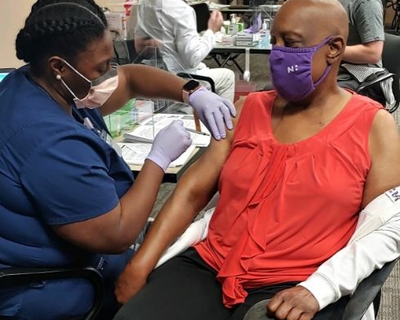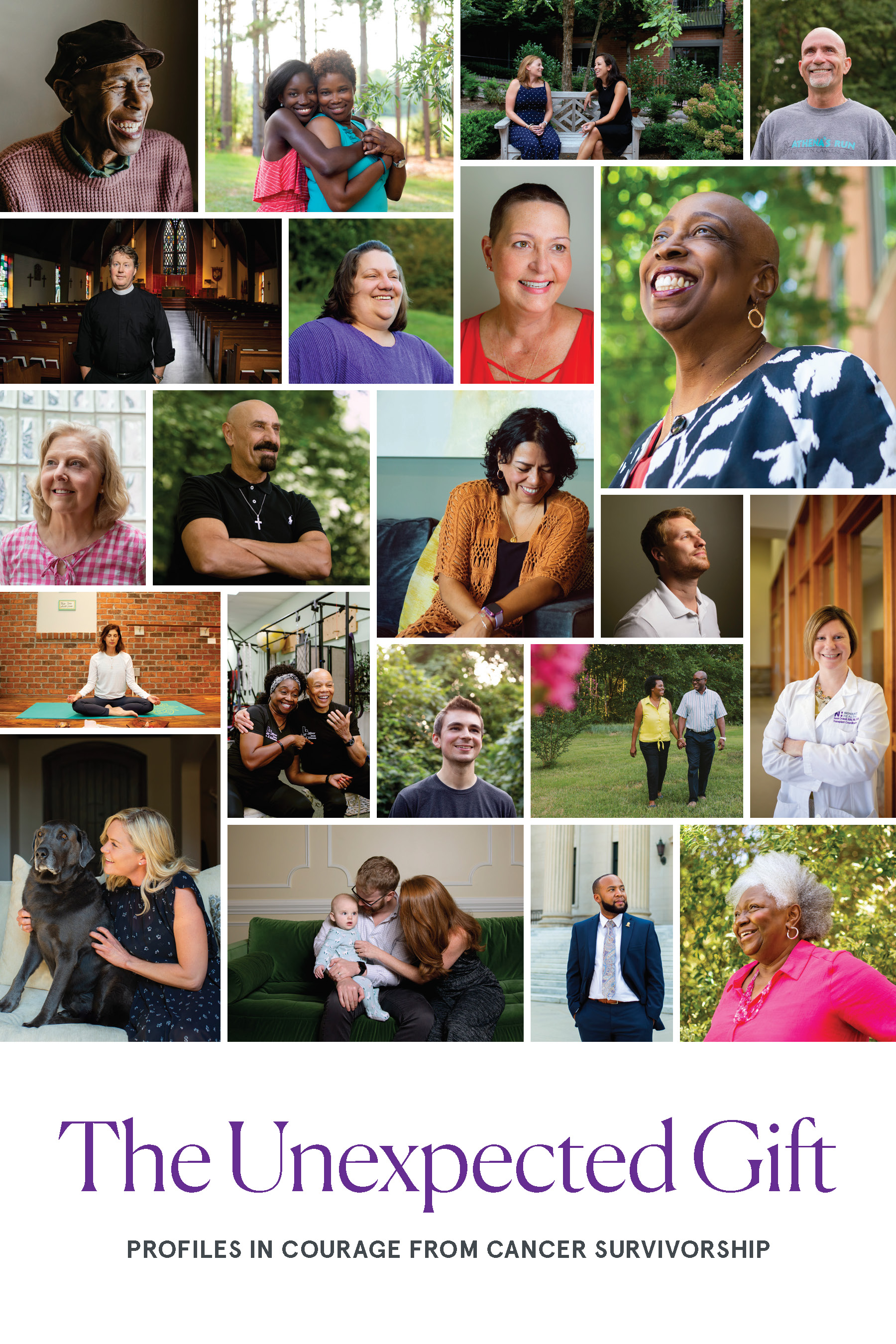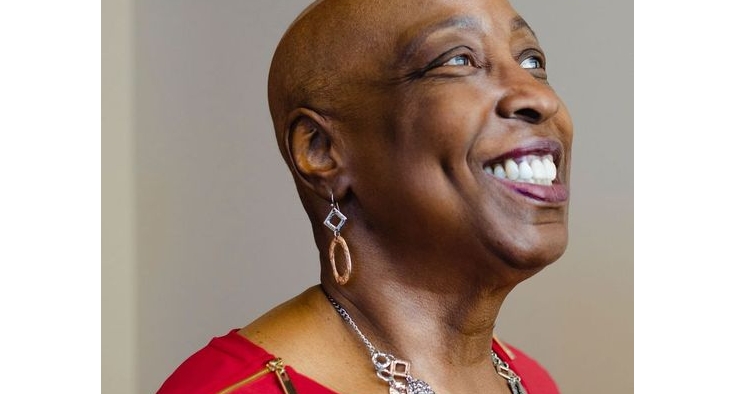Editor's note: Dr. Ophelia Garmon-Brown passed away on Nov. 17, 2021.
Dr. Ophelia Garmon-Brown just wants to go grocery shopping again.
The Novant Health family physician hasn’t left her house – except for doctors’ visits – since March 2020. She was treated for cancer in 2012, 2014 and again in 2016 (when she learned she had a brain tumor and cancer in her right kidney), and those treatments have left her immunocompromised.
While some of us bemoan missing eating out and taking vacations, Garmon-Brown simply longs to walk the aisles of a grocery store.
And she’s hopeful that day may soon be here. She’s had her first dose of the COVID-19 vaccine – and experienced no side effects – and it felt a little like freedom.

Healthcare workers like Garmon-Brown made up the first phase of “vaccinees.” But Garmon-Brown didn’t get her shot when her colleagues got theirs. “I waited for that second group – the people 65 and over,” she said. “I didn't go in as a healthcare provider. I felt like I needed to leave those shots for the people who are actually on the front lines. It was important for me not to jump in line.”
That selflessness is part of why Garmon-Brown is beloved within Novant Health and throughout the Charlotte community.
Even from her home – through media interviews, webinars, Zoom calls – she’s been an advocate for the vaccine. Still, she gave it thought before getting it. “I had a little bit of hesitancy,” she said. “It was so politicized, and the name – ‘Operation Warp Speed’ – doesn’t do much to instill confidence. My hesitation didn't last long, because I knew the only way to become a bit freer is by getting the vaccine.”
“That doesn't mean I’m rushing out,” she continued. “I'll obviously wear masks and do the other two W’s – washing hands and waiting 6 feet apart. It does mean, though, that I feel a little more secure when people come visit. I try to limit my visitors – mainly my family and very few friends.”
She has been extra cautious this past year. “We all know stories about people who felt they did everything right and still got COVID-19. Having the vaccination does give me a sense of security that maybe – one day soon – I can be a little bit more free. And when I say free, I mean physically and mentally. I've been pretty much a prisoner in my house since March.”
Science and faith can go hand in hand
Garmon-Brown trusts in science, but that’s only part of the reason she trusts the vaccine. The ordained minister said, “I believe faith and science go hand in hand. I don't believe in an either/or. I believe in both/and. And I also believe that ultimately all we have is from God and made by God.”
“My faith and my science are one,” she added.
She understands vaccine hesitancy – especially in the Black community. But she’s also aware that COVID-19 is infecting and killing a disproportionate number of African Americans and Latinos. She lost a close relative to COVID-19 about three months ago.
Garmon-Brown never presumes to know the reasons behind someone’s objections. Instead, she asks. “We may assume it's from Tuskegee or Henrietta Lacks, and that kind of historical abuse of African Americans that healthcare and government have been a part of,” she said. “But it could be something else. Maybe your uncle had a severe reaction to a flu vaccination and that scared you. I see these as moments for me to learn what your objections, fears and anxieties are, what your truths are, and I can share my own. Hopefully, through conversation and communication, we can learn from each other.”
She’s been talking to people lately about the vaccine variants that have shown up all over the globe, including the United States. “People concern themselves about the mutations,” she said. “But viruses do that. It's why we get a new flu shot every year. Viruses and cancers, I think, are like sister and brother. Cancers mutate, and that's why you're always chasing them, and viruses mutate and you're always chasing them. That's just the nature of what they do, and science is well aware of that.”
Hope and gratitude
Vaccine distribution is giving her hope. “I think the current administration has this level of empathy that African Americans tend to lean toward,” she said. “They also allow scientists to do what they do and speak their minds. They’re putting their faith in science.”
Garmon-Brown has faith in Novant Health, too. “I am so grateful for and proud of this organization,” she said. “Our leaders, from the very beginning, took this so seriously. Our infectious disease specialist, Dr. David Priest, grabbed this and has not let it go.”
She cites Novant Health’s commitment to equity in vaccine distribution as one point of pride. “Mass vaccination sites are helpful and good,” she said. “But they are usually at places where people on the margins of life have difficulty getting. Look at the vaccinations going on at the Speedway, for instance. Now, that’s a great thing. But people on the bus line cannot easily get there. It’s people of means who can drive a car to get the vaccination.”
“But Novant Health said: We’re going where people on the margins are,” she added. “We’ll go to churches where African Americans and Latinos worship. We are not going to let the gap increase.”

The Marvelous OG-B. Learn more about Dr. Ophelia Garmon-Brown by reading her newly published book, “The Unexpected Gift: Profiles in Courage from Cancer Survivorship.” It speaks directly to people who have gotten a cancer diagnosis, as well as their families and friends. “Cancer itself is not a gift,” she said, “but how you deal with it can turn it into one. Don’t bury yourself in the fear and pain of it. Be inspired.”
Note: Readers of Healthy Headlines have asked if it’s safe for cancer patients to receive the COVID-19 vaccine. The answer: In most cases, yes. The American Society of Clinical Oncology states that a “panel of oncology and infectious disease experts agreed that the Pfizer, and now Moderna, vaccines have been shown to be safe and effective for the general population and there was no evidence that they would not be safe for most cancer patients. Although, it should be noted that patients receiving immunosuppressive and cytotoxic treatments were excluded from participation in the vaccine trials to date, so there is little to no data on the safety and efficacy of the Pfizer and Moderna vaccines in cancer patients.”






